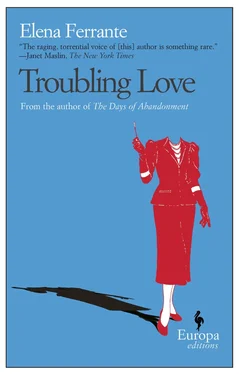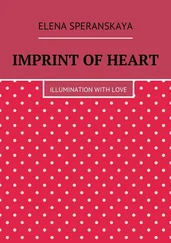I walked faster, after making sure yet again that Caserta hadn’t followed me. The neighborhood, in spite of the disappearance of a number of details (on the yellow-green pond where I used to play an eight-story building had risen), seemed to me still recognizable. Children shouted in the potholed streets as they always had at the start of summer. The same cries in dialect came from the houses, with their open windows. The layout of the buildings followed the same unimaginative geometry. Even some impoverished commercial enterprises of that time had lasted over the decades: for example, the shop underground, where I had gone to buy soap and lye for my mother, was still open in the same crumbling structure of so many years earlier. Now it displayed on the threshold brooms of every type, plastic containers, and drums of detergent. I looked in for a moment, thinking I would find there the broad cavern of my memory. Instead it closed on me like a broken umbrella.
The building where my father lived was a few meters away. I had been born in that house. I went through the gate and made my way securely among the low, poor structures. I entered through a dusty doorway: the tiles of the entrance were broken, there was no elevator, the marble of the stairs was cracked and yellowed. The apartment was on the third floor and I hadn’t been there for about ten years. As I went up I tried to redraw the map of it in such a way that the impact with that space wouldn’t be too disturbing. The door opened onto a corridor without windows. There were two rooms and a kitchen. At the back on the left was the dining room, irregularly shaped, with a silverware cupboard for silverware that we had never had, a table used for some festive lunches, and a double bed where I and my sisters slept, after nightly quarrels to decide who of the three was to sacrifice and sleep in the middle. Next to that was the toilet, a long room with a narrow window, containing the toilet and a movable bidet of enameled metal. After that came the kitchen: the sink where in the morning we took turns washing, a hearth of white majolica that had fallen quickly into disuse, a copper boiler full of pots that Amalia polished carefully. Finally there was my parents’ bedroom, and, next to it, a storeroom with no light, suffocating, crammed with useless objects.
We were forbidden to enter my father and mother’s room: it was tiny. Opposite the bed was an armoire with a mirrored central panel. On the right-hand wall was a dressing table with a rectangular mirror. On the opposite side, between the edge of the bed and the window, my father had set up the easel, a tall, massive object, with thick feet, gnawed by woodworms, from which hung dirty rags for drying the brushes. A few inches from the edge of the bed was a chest where the tubes of paint were thrown randomly: the white was the biggest and the most easily identifiable, even when it had been squeezed and rolled up to the threaded neck; but many of the tubes were remarkable, sometimes for a name that recalled the prince in a fairy tale, like Prussian blue, sometimes for the aura of devastating fire, like burnt sienna. The cover of the chest was of plywood, and movable, and on it stood a carafe that held brushes and another that held turpentine, and a gulf of colors mixed by the brushes in a many-colored sea. The octagonal tiles of the floor there had disappeared under a gray crust that had dripped down from the brushes over the years. There were rolls of prepared canvases, provided by the men who commissioned the work; the same who later, having given him a few lire, took care of delivering the finished product to the traveling peddlers, offering their wares on the city sidewalks, in the neighborhood markets, at village fairs. The house was pervaded by the odor of oil paints and turpentine but none of us noticed it any longer. Amalia had slept with my father for almost two decades without ever complaining.
On the other hand she did complain when he stopped making portraits of women for the American sailors and scenes of the bay and began to work on the half-naked dancing Gypsy. I had only a confused memory of that time, based more on Amalia’s stories than on direct experience: I was no more than four. The bedroom walls were crowded with exotic women in bright colors, interspersed with sketches of nudes drawn with a blood-red pastel. Often the poses of the Gypsy were rough copies of some photographs of women that my father kept hidden in a box in the closet and that I peeked at in secret. At other times the shapes of the blood-red nudes appeared in oil paintings.
I had no doubt that the pastel sketches reproduced my mother’s body. I imagined that at night, when they closed the door of their bedroom, Amalia took off her clothes, posed like the naked women in the photographs in the closet, and said: “Draw.” He took a roll of yellow paper, tore off a piece, and drew. What he did best was the hair. He would leave those women without features but above the empty oval of the face he would skillfully draw a majestic construction, unmistakably similar to the beautiful creation that Amalia knew how to make with her long hair. I tossed and turned in the bed, unable to sleep.
When our father finished the Gypsy, I was sure of it and so was Amalia: the Gypsy was her: less beautiful, the proportions wrong, the colors smudged; but her. Caserta saw it and said it was no good, it wouldn’t sell. He seemed annoyed. Amalia intervened, she said she agreed. She and Caserta teamed up against my father. There was a discussion. I heard their voices streaming down the stairs. When Caserta left, my father without warning hit Amalia twice in the face with his right hand, first with the palm and then the back. I remembered that gesture precisely, with its wavelike motion, going and coming: I was seeing it for the first time. She fled to the end of the hall, to the storeroom, and tried to lock herself in. She was dragged out and kicked. One blow struck her in the hip and hurled her against the armoire in the bedroom. Amalia got up and tore all the drawings off the walls. He caught her, grabbed her by the hair, pounded her head against the mirror of the armoire, which broke.
People liked the Gypsy, especially at the country fairs. Forty years had passed and my father was still doing it. In time he had become very quick. He attached the blank canvas to the easel and sketched the outlines with an expert hand. Then the body became bronze with reddish highlights. The belly curved, the breasts swelled, the nipples rose. Meanwhile sparkling eyes emerged, red lips, raven hair, masses of it, combed in Amalia’s style, which over time had become old-fashioned but evocative. In a few hours the canvas was finished. He took out the thumbtacks that held it in place, pinned it to the wall to dry, and arranged another blank canvas on the easel. Then he began again.
During adolescence I saw those figures of a woman leave the house in the hands of strangers who were not sparing with their crude comments. I didn’t understand and perhaps there was nothing to understand. How was it possible that my father could hand over, to vulgar men, bold and seductive versions of that body which if necessary he would defend with a murderous rage? How could he place it in lewd poses when for an immodest smile or look he became a wild beast, without pity? Why did he abandon it on the streets and in the houses of strangers, by the tens and hundreds of copies, when he was so jealous of the original? I looked at Amalia bent over her sewing machine until late at night. I thought that, as she worked like that, silent and preoccupied, she, too, asked herself those questions.
The door of the apartment was half-open. I felt timid and so I entered with such determination that the door hit the wall with a crash. There was no reaction. Only an intense odor of paint and cigarette smoke hit me. I went into the bedroom with the sensation that over the years the rest of the apartment had fallen apart. I was certain, however, that in that room everything remained unchanged: the double bed, the armoire, the dressing table with the rectangular mirror, the easel beside the window, the canvases rolled up in every corner, the stormy seas, the Gypsies, and the country idylls. My father’s back was to me, large and bent, in an undershirt. His sharp skull was bald, spotted with dark patches. A shock of white hair covered his neck.
Читать дальше












